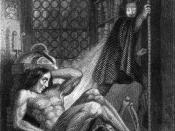In society, citizens are expected to confirm to certain ideals; a set of assumptions, concepts, values, and practices that constitutes their way of viewing reality. The nineteenth century was a pivotal period in European history that included key changes in social classes, the 'Industrial Revolution', extensive urbanization and both religious enlightenment and rebellion. The protagonists in Jane Austen's Pride and Prejudice, Mary Shelly's Frankenstein and Leo Tolstoy's Anna Karenina are each an example of iconoclastic individuals struggling in their society's expectations.
The BBC production of Jane Austen's Pride and Prejudice, directed by Simon Langton is a carefully replicated period love story for a contemporary audience.
The dialogue and repartee, is thoroughly crafted, to evoke tension, wit and flirtation in the two main characters while still remaining accessible to a modern viewers. Authentic Regency costumes, settings, and a prosaic musical score provide necessary atmospheric conditions for contemporary viewing.
Actors' striking impertinent poses substitute the display of any real emotion; Elizabeth Bennet is demure in a mischievous, yet calmly desperate performance.
The subplots are illuminating without dominating. Characters in the form of Mrs. Bennet (her vicarious need to be successful through her daughter's marriages, intended for wealth and social status, portrays the false impression that she cares about them.), Lydia and Collins are emphatically caricatured to elucidate social satire. The institution of marriage, and economic insecurity for women is contrasted by Jane and Elizabeth's resolves to marry for love with Charlotte's choice to wed for stability. Representations of social behaviours and aristocratic pretension are well suited for the medium, portrayed artistically with camera shots that allow the viewer to engage with Austen's characters.
The production negotiates the intricacies of Regency society that threaten the individual in society. A woman in Regency times was excluded from all professions and higher public offices. Most...


